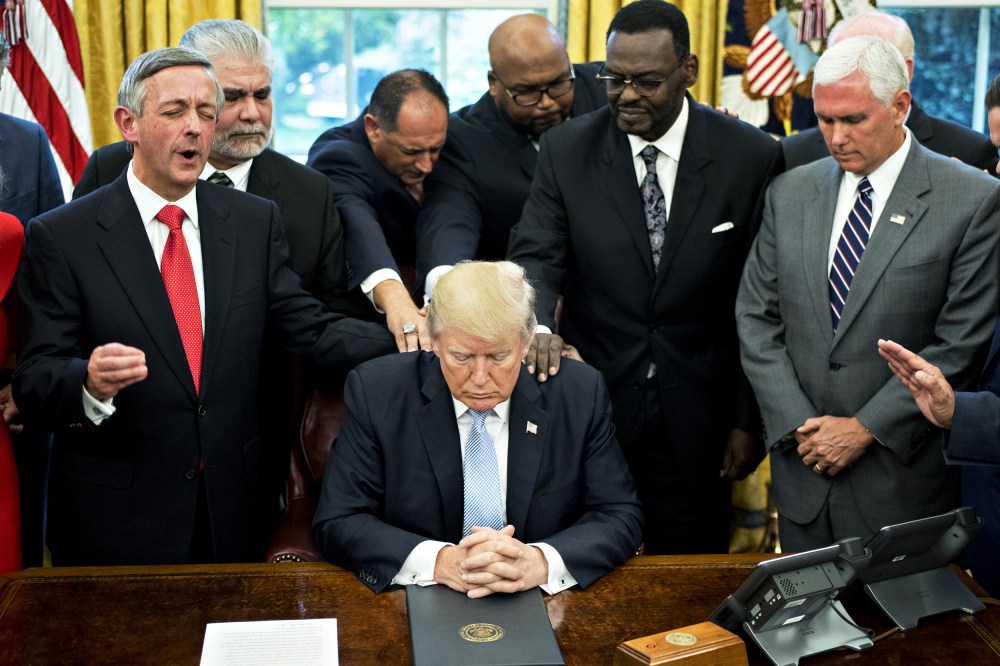Want a preview of the 2022 election cycle? Look no further than the Southern Baptist Convention, or SBC, starting this week in Nashville, Tennessee. The Republican “culture wars” playbook will be front and center at this high-profile meeting of America’s largest Protestant denomination. The SBC is set to tackle buzzy topics like critical race theory, or CRT, sex abuse and women’s role in ministry. But the most pressing question is how will a denomination that formed in part to defend slavery deal with racism. Will it condemn CRT and risk losing Black churches and members? Or will it strike a middle ground?
But the most pressing question is how will a denomination that formed in part to defend slavery deal with racism.
SBC 2021 is a litmus test not only for the denomination, but also for the Republican Party. Since 2008, the group’s membership has shifted 20 percent to the right, according to sociologist Ryan Burge of Eastern Illinois University. This shift represents not only a large bloc of evangelical voters who are in a denomination that is becoming even more connected to right-wing conservative politicians. Demographically, it also shows the fault lines that threaten to tear it apart. The denomination has lost over 2 million members since 2006, which dovetails with the lowest numbers of Republican Party affiliation in 10 years.
Despite the declining numbers, the SBC may very well decide to play the race card, gambling that white fear of America’s racist history is important to its conservative membership. This is the same gamble GOP lawmakers are making across the country, as state and national lawmakers try to legislate school curricula.
It’s not very often I make one of those “gasp” type graphs – but this is one of them.
— Ryan Burge 📊 (@ryanburge) June 14, 2021
As late as the mid-2000s, the partisanship of white SBC was not that different than white United Methodists.
The SBC turned hard right, and the percent who were Republicans jumped 20 pts! https://t.co/aqT12094mZ
At issue is the denomination’s official 2019 statement on CRT, which conceded that the (very general) concept can be useful. Some hope to make the language even stronger this year, while others want to rescind the 2019 statement altogether. A resolution endorsed by conservative members claims that CRT is “rooted in Neo-Marxist and postmodern world views.”
It’s a potentially defining move for the denomination, which has continually made statements since the 1990s to repent of its former slaveholder leadership in the denomination, as well as in its seminaries. CRT, for some Southern Baptists, is a structural problem. For others, that is a bridge too far. It is important to note that the SBC has never rescinded previous statements, including a resolution in 1861 aligning the convention with the Confederacy.
It also puts the SBC’s Black congregations in a tough spot. The SBC has made a push to diversify recently, even paying top dollar to Black pastors who wanted to join its ranks with generous startup funds. But these efforts to recruit Black Baptist churches and pastors could be undermined by what happens this week. Several Black pastors broke with the SBC in December over a statement condemning CRT by six presidents of SBC seminaries. Prominent Black pastors like Dwight McKissick have already threatened to leave the denomination if the vote goes negatively. Another Black SBC pastor, Tez Andrews, was fired last year for speaking out against an anti-CRT candidate for SBC president.

And CRT isn’t the only issue dividing Baptists right now. The group’s rightward drift and unwavering support for former President Donald Trump have roiled the community and led to several high-profile departures. Arguably its most prominent evangelist, Beth Moore, left the denomination this year after she was pilloried for her criticism of Trump and the denomination’s handling of sexual misconduct scandals.












